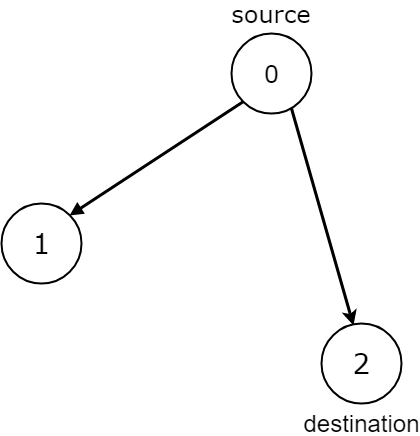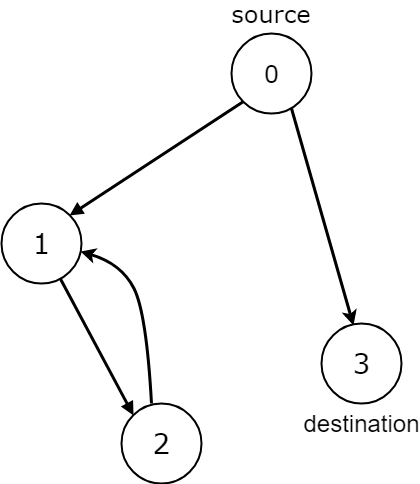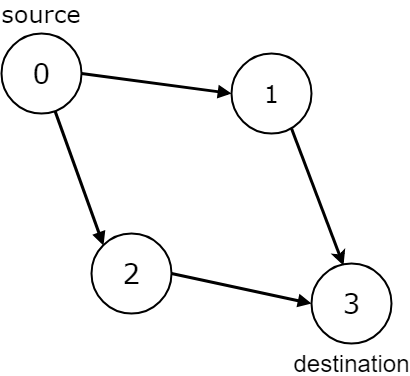Welcome to Subscribe On Youtube
1059. All Paths from Source Lead to Destination
Description
Given the edges of a directed graph where edges[i] = [ai, bi] indicates there is an edge between nodes ai and bi, and two nodes source and destination of this graph, determine whether or not all paths starting from source eventually, end at destination, that is:
- At least one path exists from the
sourcenode to thedestinationnode - If a path exists from the
sourcenode to a node with no outgoing edges, then that node is equal todestination. - The number of possible paths from
sourcetodestinationis a finite number.
Return true if and only if all roads from source lead to destination.
Example 1:

Input: n = 3, edges = [[0,1],[0,2]], source = 0, destination = 2 Output: false Explanation: It is possible to reach and get stuck on both node 1 and node 2.
Example 2:

Input: n = 4, edges = [[0,1],[0,3],[1,2],[2,1]], source = 0, destination = 3 Output: false Explanation: We have two possibilities: to end at node 3, or to loop over node 1 and node 2 indefinitely.
Example 3:

Input: n = 4, edges = [[0,1],[0,2],[1,3],[2,3]], source = 0, destination = 3 Output: true
Constraints:
1 <= n <= 1040 <= edges.length <= 104edges.length == 20 <= ai, bi <= n - 10 <= source <= n - 10 <= destination <= n - 1- The given graph may have self-loops and parallel edges.
Solutions
There are 2 cases it should return false.
- case 1: it encounters a node that has no outgoing edges, but it is not destination.
- case 2: it has cycle.
Otherwise, it returns true.
Could iterate graph with BFS. When indegree of a node becomes negative, then ther is cycle.
Time Complexity: O(n+e)
- e = edges.length.
Space: O(n+e).
-
class Solution { private List<Integer>[] g; private int[] f; private boolean[] vis; private int k; public boolean leadsToDestination(int n, int[][] edges, int source, int destination) { vis = new boolean[n]; g = new List[n]; k = destination; f = new int[n]; Arrays.setAll(g, key -> new ArrayList<>()); for (var e : edges) { g[e[0]].add(e[1]); } return dfs(source); } private boolean dfs(int i) { if (i == k) { return g[i].isEmpty(); } if (f[i] != 0) { return f[i] == 1; } if (vis[i] || g[i].isEmpty()) { return false; } vis[i] = true; for (int j : g[i]) { if (!dfs(j)) { f[i] = -1; return false; } } f[i] = 1; return true; } } ////// public class All_Paths_from_Source_Lead_to_Destination { class Solution_bfs { public boolean leadsToDestination(int n, int[][] edges, int source, int destination) { Set<Integer>[] graph = new Set[n]; // node => set of its next nodes for (int i = 0; i < n; i++) { graph[i] = new HashSet<Integer>(); } int[] inDegrees = new int[n]; for (int[] edge : edges) { graph[edge[0]].add(edge[1]); inDegrees[edge[1]]++; } LinkedList<Integer> q = new LinkedList<Integer>(); q.add(source); while (!q.isEmpty()) { int cur = q.poll(); if (graph[cur].size() == 0 && cur != destination) { return false; } for (int nei : graph[cur]) { if (inDegrees[nei] < 0) { // i.e. a cycle return false; } inDegrees[nei]--; q.add(nei); } } return true; } } class Solution_dfs { public boolean leadsToDestination(int n, int[][] edges, int source, int destination) { Map<Integer, Set<Integer>> graph = new HashMap<>(); for (int[] edge : edges) { Set<Integer> neighbours = graph.getOrDefault(edge[0], new HashSet<>()); neighbours.add(edge[1]); graph.put(edge[0], neighbours); } if (graph.get(destination) != null) return false; boolean[] isVisited = new boolean[n]; isVisited[source] = true; return dfs(graph, isVisited, source, destination); } private boolean dfs(Map<Integer, Set<Integer>> graph, boolean[] isVisited, int source, int destination) { if (source == destination) { return true; } Set<Integer> neighbours = graph.getOrDefault(source, new HashSet<>()); if (neighbours.size() == 0) return false; for (int neib : neighbours) { if (isVisited[neib]) return false; // cycle spotted isVisited[neib] = true; if (!dfs(graph, isVisited, neib, destination)) return false; isVisited[neib] = false; } return true; } } } -
class Solution { public: bool leadsToDestination(int n, vector<vector<int>>& edges, int source, int destination) { vector<bool> vis(n); vector<vector<int>> g(n); vector<int> f(n); for (auto& e : edges) { g[e[0]].push_back(e[1]); } function<bool(int)> dfs = [&](int i) { if (i == destination) { return g[i].empty(); } if (f[i]) { return f[i] == 1; } if (vis[i] || g[i].empty()) { return false; } vis[i] = true; for (int j : g[i]) { if (!dfs(j)) { f[i] = -1; return false; } } f[i] = 1; return true; }; return dfs(source); } }; -
class Solution: # dfs def leadsToDestination( self, n: int, edges: List[List[int]], source: int, destination: int ) -> bool: @cache def dfs(i): if i == destination: return not g[i] if i in vis or not g[i]: # not g[i]: not destination but no more neigbours return False vis.add(i) for j in g[i]: if not dfs(j): return False return True g = defaultdict(list) for a, b in edges: g[a].append(b) vis = set() return dfs(source) ######### from collections import defaultdict, deque class Solution: # bfs def leadsToDestination(self, n: int, edges: List[List[int]], source: int, destination: int) -> bool: # Build the adjacency list representation of the graph graph = defaultdict(list) for u, v in edges: graph[u].append(v) # Handle the case where the destination node has outgoing edges if graph[destination]: return False # Initialize the visited array to keep track of visited nodes during the traversal visited = [False] * n # Start the BFS traversal from the source node queue = deque([source]) visited[source] = True while queue: node = queue.popleft() # Check if the current node has no outgoing edges and is not the destination node if node != destination and not graph[node]: return False # Process the neighbors of the current node for neighbor in graph[node]: # If the neighbor has been visited before, it forms a cycle, return False if visited[neighbor]: return False visited[neighbor] = True queue.append(neighbor) # Remove the edge to prevent revisiting the same node graph[node].remove(neighbor) # Check if all nodes (except the destination) have been visited # destination node may have outgoing edges in the graph, so exclude it return all(visited[i] for i in range(n) if i != destination) -
func leadsToDestination(n int, edges [][]int, source int, destination int) bool { vis := make([]bool, n) g := make([][]int, n) f := make([]int, n) for _, e := range edges { g[e[0]] = append(g[e[0]], e[1]) } var dfs func(int) bool dfs = func(i int) bool { if i == destination { return len(g[i]) == 0 } if f[i] != 0 { return f[i] == 1 } if vis[i] || len(g[i]) == 0 { return false } vis[i] = true for _, j := range g[i] { if !dfs(j) { f[i] = -1 return false } } f[i] = 1 return true } return dfs(source) } -
function leadsToDestination( n: number, edges: number[][], source: number, destination: number, ): boolean { const g: number[][] = Array.from({ length: n }, () => []); for (const [a, b] of edges) { g[a].push(b); } if (g[destination].length > 0) { return false; } const st: number[] = Array(n).fill(0); const dfs = (i: number): boolean => { if (st[i] !== 0) { return st[i] === 2; } if (g[i].length === 0) { return i === destination; } st[i] = 1; for (const j of g[i]) { if (!dfs(j)) { return false; } } st[i] = 2; return true; }; return dfs(source); }